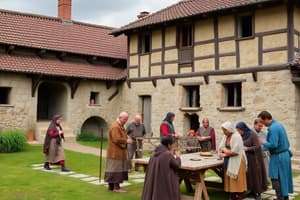Podcast
Questions and Answers
Which historical period is characterized by the dominance of ancient civilizations such as Egypt and Mesopotamia?
Which historical period is characterized by the dominance of ancient civilizations such as Egypt and Mesopotamia?
- The Renaissance
- Prehistory
- Ancient Civilizations (correct)
- The Industrial Revolution
What is the primary focus of social history?
What is the primary focus of social history?
- The examination of rulers and political institutions
- The evolution of economic systems
- The experiences of ordinary people and social groups (correct)
- The analysis of art and cultural practices
What is periodization in historical study?
What is periodization in historical study?
- A method of evaluating economic systems
- An analysis of cultural expressions
- The process of subdividing history into different time periods (correct)
- A focus on political events and leaders
Which approach to history emphasizes the importance of economic systems and trade?
Which approach to history emphasizes the importance of economic systems and trade?
Why is it important to study history?
Why is it important to study history?
What challenge do historians face when interpreting primary sources?
What challenge do historians face when interpreting primary sources?
Which concept in historical study is concerned with the relationships between events?
Which concept in historical study is concerned with the relationships between events?
What does understanding context in historical events entail?
What does understanding context in historical events entail?
Flashcards
History
History
The study of past events, from ancient times to the present, using various sources like written documents, archaeological findings, and oral traditions.
Periodization
Periodization
Dividing history into distinct periods based on significant events or trends, like the Renaissance or the Industrial Revolution.
Social History
Social History
Focusing on the experiences of ordinary people and social groups within a specific historical context.
Cultural History
Cultural History
Signup and view all the flashcards
Political History
Political History
Signup and view all the flashcards
Economic History
Economic History
Signup and view all the flashcards
Causality
Causality
Signup and view all the flashcards
Context
Context
Signup and view all the flashcards
Study Notes
Historical Periods and Trends
- History is the study of past events, from ancient civilizations to modern times.
- Historians use various sources, including written documents, archaeological findings, and oral traditions, to understand the past.
- Key historical periods include prehistory, ancient civilizations (e.g., Egypt, Mesopotamia), the Middle Ages, the Renaissance, the Age of Exploration, the Enlightenment, the Industrial Revolution, and the 20th and 21st centuries.
- Each period shows unique social, political, economic, and cultural developments.
Approaches to History
- Historians use various methodologies and perspectives.
- Key approaches include:
- Periodization: Dividing history into distinct time periods based on significant events or trends.
- Social history: Focusing on ordinary people and social groups' experiences within a historical context.
- Cultural history: Analyzing cultural expressions and practices across societies and time periods.
- Political history: Examining political institutions, leaders, and events.
- Economic history: Analyzing economic systems, trade, and production throughout history.
- Different schools of thought influence historical interpretations.
Importance of Studying History
- Understanding the past is crucial for understanding the present.
- Historical analysis helps understand societal structures, changes, and civilization development.
- It allows for examining continuity and change over time.
- History develops critical thinking skills by encouraging source analysis and diverse perspectives.
- Studying history helps learn from past successes and failures, informing future decisions.
Challenges in Studying History
- Historical sources might be incomplete or biased, making accurate reconstruction challenging.
- Interpreting primary sources needs careful consideration of context and limitations.
- Historians face differing interpretations and conflicting historical narratives.
Key Concepts in Historical Study
- Causality: Investigating cause-and-effect relationships in historical events.
- Context: Understanding historical events within their social, political, economic, and cultural environments.
- Bias: Recognizing potential biases in sources and acknowledging their impact on interpretations.
- Historiography: Studying how historical interpretations evolve over time.
- Agency: Examining the power of individuals and groups to shape history.
- Continuity and Change: Analyzing both enduring aspects and transformations throughout time.
- Periodization: Organizing history into distinct periods based on major events and developments.
Studying That Suits You
Use AI to generate personalized quizzes and flashcards to suit your learning preferences.




